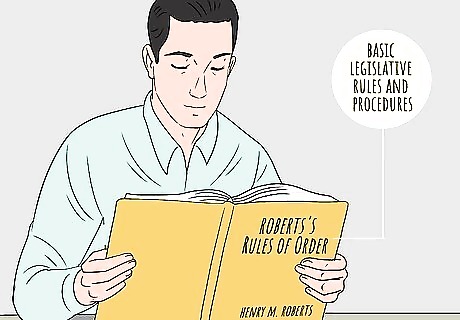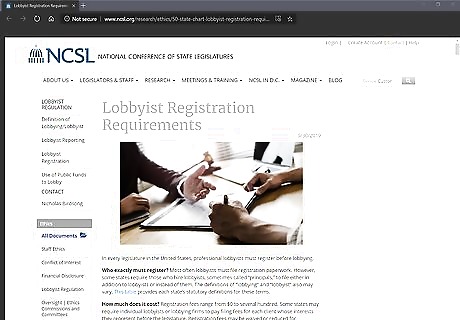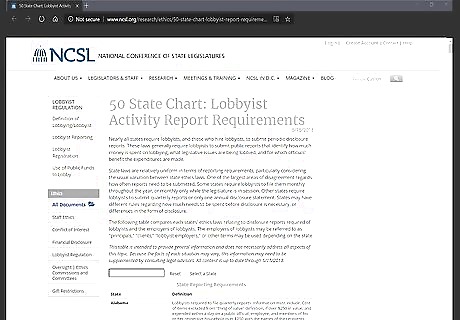
views
X
Trustworthy Source
National Conference of State Legislatures
Bipartisan, nongovernment organization serving the members of state legislatures and their constituents
Go to source
If you’re a persuasive person with a passion for making a difference, a lobbying career might be right for you! While there are no specific educational requirements to become a lobbyist, you can benefit from having a strong background in the law or political science. You’ll also need to register with your local government to work as a lobbyist. From there, you can start looking for lobbyist careers!
Getting the Right Training

Take courses in political science or related fields. You don’t have to have a degree in a specific field to become a lobbyist. However, studying political science or other relevant subjects can give you the skills and knowledge you need to be successful. Specific lobbying jobs may also require you to have a minimum level of education (e.g., a bachelor’s degree).Tip: Although there are no formal education or certification requirements to work as a lobbyist, you can get a lobbying certification from professional organizations such as the National Institute for Lobbying and Ethics (NILE). For example, many lobbyists have degrees in political science, communications, economics, or law.

Build strong communication skills. Being able to communicate clearly and persuasively is key to being a successful lobbyist. If you’re in school or college, sign up for courses in writing and public speaking to build up your written and verbal communication abilities. Signing up for your school’s debate team or mock trial club can be a great way to hone your argumentative skills! You can also take writing and speaking classes online through websites like Udemy, Coursera, and edX.

Pursue an advanced degree to get a competitive edge. You don’t need an advanced or specialized degree to be a lobbyist, but getting one of these degrees can make you look more impressive to employers. This is also a useful approach if you want to lobby in a particular area of interest. For example, if you want to work as a health care lobbyist, you may find it helpful to pursue an advanced healthcare degree, such as DNP (Doctor of Nursing Practice). A law degree can also give you a competitive advantage in the lobbying field.

Learn about basic legislative rules and procedures. Understanding how the legislative process works can help you become a much more effective lobbyist. Take time to research how the system works so that you have a strong understanding of how measures are introduced and how bills are passed. Robert’s Rules of Order is a very useful guide to the basic rules of legislative procedure. Many state government websites offer specific information about local legislative process. Try doing an online search using terms such as “legislative process Illinois” or “how a bill becomes law Texas.”

Read up on current issues in your area of interest. If you’re interested in lobbying in a particular field, stay on top of current events and legislative issues in that field, especially in your local area. Staying informed on what the issues are—and where your local lawmakers stand—will help you figure out which legislators to target and how to build the most persuasive arguments. Take time getting to know your local politicians, their histories, and where they stand on the issues you’re interested in. You may find it helpful to talk to other lobbyists in your area and get their perspective on how the system works.

Spend time in a government job to gain experience. A lot of people break into the lobbying field after working in a government office. Doing so can help you gain expertise in local policy making procedures and will also make you look more impressive to prospective employers or clients. You might try: Running for elected office in the legislative or executive branches of your local government. This will give you direct experience with the legislative process. If you can’t run for office, getting a staff position with the legislature is another great way to get your foot in the door. For example, you might apply to be a legislative assistant for your local congressperson.
Registering as a Lobbyist

Look into your state’s lobbying registration laws. All states in the U.S. require lobbyists to register with the state before doing any lobbying activities. Before you start working as a lobbyist, check with your Secretary of State’s office to find out what information you need to provide and whether you need to pay a registration fee.Did you know? In some states it is free to register as a lobbyist, while others may charge a fee of several hundred dollars. In some cases, you may even be required to pay a fee for each client you represent. You can find a list of registration requirements by state here: http://www.ncsl.org/research/ethics/50-state-chart-lobbyist-registration-requirements.aspx You may need to supply information such as what kind of compensation you are receiving for your lobbying work, who your clients or employers are, and which subject(s) you’ll be lobbying about.

Take any required lobbying courses before registering. Some states require lobbyists to take training courses or seminars before doing any lobbying work. These courses typically focus on ethics training. Check with your Secretary of State’s office to find out if you need any special training before you begin work. For example, lobbyists in California are required to take a Lobbyist Ethics Course and certify the completion of this course with the Secretary of State’s office by a specific deadline.

Keep up with your lobbying reports. Most states require lobbyists to file regular disclosure reports about their activities. Inquire with your Secretary of State’s office about how often you need to file reports and what kind of information you have to provide. You can find a summary of activity report requirements for each state here: http://www.ncsl.org/research/ethics/50-state-chart-lobbyist-report-requirements.aspx. These reports are available to the public and they usually contain information about how much money you or your client are spending on lobbying and which issues you are lobbying about. Your employer or client may also need to file reports about your activities.
Finding Lobbyist Jobs

Familiarize yourself with the types of lobbying jobs. There are a variety of different ways to approach being a lobbyist. You can work as a contracted lobbyist for an organization such as a company or trade association, or you can work in-house as a full time government relations employee for a business. Local government administrations also hire lobbyists to communicate with the legislature on their behalf. For example, a drug company might hire a health care lobbyist full time in a government relations position. Think about what you're passionate about and see if there are any lobbyist positions that align with that.Tip: If you’re passionate about making a difference but don’t see lobbying as your primary career, you can also work as a volunteer lobbyist.

Check lobbyist-specific job boards. When you’re ready to look for lobbyist jobs, dedicated job boards or sites devoted to lobbying-related jobs are a good place to start. For example, you might look for jobs in your area on websites such as: Lobbyingjobs.com, a website dedicated to posting lobbyist and government relations positions. Workforgood.org, which posts jobs with nonprofits and mission-driven organizations, including advocacy/lobbying jobs. The PAC.org job board, which lists job opportunities for public affairs professionals.

Look for lobbyist jobs on general job sites. In addition to using dedicated job boards, you can also find lobbyist jobs on general job sites such as Indeed and Monster.com. Use these sites to search for lobbyist jobs in your area. In addition to “lobbyist,” use search terms such as “advocacy” and “government relations.”

Reach out to your professional network about job opportunities. Many lobbyists find jobs through networking and word of mouth. If you’ve had a chance to make some contacts in your community, let them know that you are in the market for a lobbying job. Someone may be able to put in a good word for you with a colleague who’s looking to hire! Talking to other lobbyists can be a good way to find out about potential job openings.

Apply for jobs that align with your interests and experience. You’ll be most happy and successful as a lobbyist if you do work in an area that you’re passionate and knowledgeable about. Look for positions that are a good fit for your strengths and interests, but that also align well with your personal moral and ethical standards. For example, if you’re interested in health issues, a job with a public health organization might be a good fit for you. On the other hand, you might not be happy lobbying for a tobacco company that’s pushing for fewer restrictions on advertising.

















Comments
0 comment